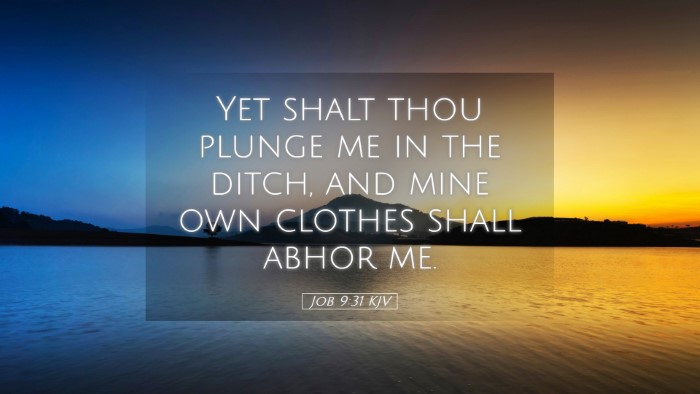Commentary on Job 9:31
Verse (Job 9:31): "If he seek to drown me in the ditch, I cannot escape." This verse expresses a deep sense of despair and the feeling of being overwhelmed by circumstances beyond one’s control.
Contextual Overview
The book of Job addresses profound questions concerning suffering, divine justice, and the human condition. Job, a figure of immense suffering and loss, engages in a dialogue questioning God's ways. In Job 9:31, he articulates his feelings of being entrapped by his circumstances, depicting a sense of helplessness. This representation of the 'ditch' symbolizes a state of despair from which he believes there is no escape.
Theological Insights
Divine Sovereignty: Various commentators emphasize the sovereignty of God. Matthew Henry notes that God is the ultimate authority over every situation; thus, Job’s declaration reflects his understanding of divine power, yet it also shows his utter hopelessness in the face of it. This speaks directly to the character of God as depicted in Scripture—a being who is more than capable of intervening in human affairs, yet at times appears silent in the midst of suffering.
Human Helplessness: Albert Barnes underscores Job's perception of his helplessness. This resonates with the human experience, where trials seem insurmountable. The 'ditch' becomes a metaphor for the overwhelming nature of suffering and the inadequacy of human efforts to remedy the situation. It calls to mind Psalm 40:2, "He brought me up also out of a horrible pit, out of the miry clay." Here, we see the need for divine assistance, a theme which echoes throughout the Psalms.
A Cry for Justice: Adam Clarke elaborates on Job's desire for understanding and justice. Job's question about whether he can escape is indicative of his longing for someone to argue his case before God, to find a mediator (referencing later themes in the book). This desire for intercession reveals the deep-rooted need humans have for relationships and representation before the divine.
Applications for Today
- Through Suffering: Pastors may use this verse to remind their congregations that suffering is an omnipresent reality. Job’s plea is relevant for any believer who feels engulfed by circumstances. It invites deep reflection on the nature of suffering and the presence of God within it.
- Divine Mediation: The quest for a mediator, seen in this verse, can be linked to Christ as the ultimate intercessor. The New Testament emphasizes Jesus’ role in bridging the divide between humanity and God (1 Timothy 2:5). This connection provides hope to those feeling abandoned in their trials.
- Spiritual Resilience: The depiction of emotional turmoil portrayed by Job serves as a modeling of authentic faith in crisis. The acknowledgment of despair does not negate faith; rather, it positions believers to seek deeply rooted spiritual truths amidst their struggles.
Conclusion
In Job 9:31, we encounter a profound human experience—one of despair, helplessness, and the quest for divine intervention. Each commentary enlightens this verse's significance within the broader narrative of the book of Job, emphasizing themes of divine sovereignty, human suffering, and the hope for mediation. This rich tapestry of insights serves not only to illuminate the text for scholars but also to inspire pastors and students in their spiritual journeys. The acknowledgment of such stark human emotions invites believers to approach God honestly, recognizing that despair can coexist with faith. As we engage with this verse, may we be reminded of God’s presence in our struggles and the hope that is found in Christ, our mediator.


